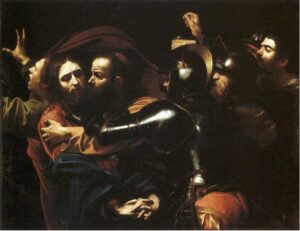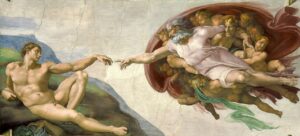Only eight people are saved in Noah’s Flood. Why is that?
If, as many believe, salvation is through man’s self-determined free will, what went wrong? Who chooses whom?
Did God elect some to be saved before the foundation of the universe, or does man, through their own free will, self-determine their own salvation?
We know that salvation throughout history is by faith and faith alone. This is supported in Ephesians 2:8-9 which declares, “For by grace you are saved through faith; and that not of yourselves, it is the gift of God; not as a result of works, so that no one may boast.”
Ignoring that one’s own effort, or free will, could easily be construed as “works” and violate this principle, let’s look to Old Testament history to consider a real-life story – the Flood of Noah in Genesis 5-9.
The New Testament repeats the truth taught in Genesis that only eight people were believers and survived the global Flood (1 Peter 3:20) – Noah, his wife, his three sons, and their wives.
Why only eight?
Let’s look at some potential answers to this question
Maybe the story of Noah is just a fabrication?
It is not uncommon to deny Old Testament stories.
But here, that presents a significant difficulty, as Jesus believed the story of Noah.
In Matthew 24:37-39, Christ states, “For the coming of the Son of Man will be just like the days of Noah. For as in those days before the Flood they were eating and drinking, marrying and giving in marriage, until the day that Noah entered the ark, and they did not understand until the Flood came and took them all away; so will the coming of the Son of Man be.”
Christ is contrasting a prophetic event, His Second Coming at the end of the Tribulation, when He will save the righteous of the world and judge the unrighteous, to an actual historical event, the Flood of Noah, where He saved the righteous, Noah and his family, and judged unrighteous humanity in the Flood.
This was not a comparison to a fabrication but rather to the true-to-life story of Noah and the Flood.
Maybe both believers and non-believers died in the Flood?
We could assume that those who died in the Flood also included believers. Therefore, there were more than eight believers; they just, unfortunately, drowned along with the unrighteous.
But that would disregard 2 Peter 2:5, which states, “and [God] did not spare the ancient world, but preserved Noah, a preacher of righteousness, with seven others, when He brought a flood upon the world of the ungodly.” 2 Peter 2:9 affirms, “the Lord knows how to rescue the godly from trial, and to keep the unrighteous under punishment for the day of judgment.”
From these verses, we would have to conclude that only non-believers died in the Flood; therefore, there were only eight believers at the time of the Flood.
Maybe there weren’t that many people around at the time of the Flood?
If the Biblical account of a New Earth, of approximately 6,000 years old, is used, Noah appears in Genesis 5:28-29 as the son of Lamech and ninth in descent from Adam. This was during the antediluvian period, which, according to Bishop Ussher’s 17th-century chronology, lasted 1656 years, from Creation around 4004 BC to the Flood or 2348 BC.
The author, in an article addressing an estimate of the population at the time of Noah, claims:
“If the growth rate in the pre-Flood world was equal to the growth rate in 2000 (0.012), there could have been about 750 million people at the time of the Flood. However, given the extremely long lifespans before the Flood [and the absence of any valid birth controls,] the growth rate could have been much higher. Increasing the rate by [just] 0.001 would put the population at nearly four billion at the Flood.”
Looking at the story of Noah, are we to assume that only eight, through their free will, chose God and that 750 million to 4 billion people rejected God because they could never muster enough free will to accept Him, even though their life span, and thus their opportunities to choose God, extended over hundreds of years.
Does this even seem plausible?
Were 750 million to 4 billion people before the Flood saddled with totally impotent free wills?
Indeed, more than eight are saved at other times in history.
Conclusion
Throughout the Old and New Testaments, God chose people to bring about His will and purposes. Abraham, Moses, and Noah are all said to have “found favor in the Lord” (Exodus 33:17, Gen 6:8 and Gen 18:3), and the choosing of the nation Israel as well as principal characters in the New Testament, such as the Apostles (John 15:16 “you did not choose me but I chose you”), along with Mary, Paul, John the Baptist, and quite obviously many, many others.
He also chose all believers before the foundation of the world as Ephesians 1:4-5 states, “Even as He chose us in him before the foundation of the world, that we should be holy and blameless before him. In love he predestined us for adoption to himself as sons through Jesus Christ, according to the purpose of his will.”
But, if election is valid, why did God only choose eight?
According to Romans 9:15, God explains to Moses, “I will have mercy on whomever I will have mercy…” God is sovereign, and through His mercy, He alone decides.
Since “all have sinned” (Romans 3:23) and the “wages of sin is death” (Romans 6:23), we know that without salvation, man is naturally at war with God as Romans 8:7 claims, “the mind of the flesh is hostile to God” and doomed to destruction.
Without God reaching down and plucking a remnant for salvation, all men would continue to reject Him, and Noah’s Flood proves this very point.
Is it not more believable than that were it not for God’s intervention in election, no man would ever be saved?








